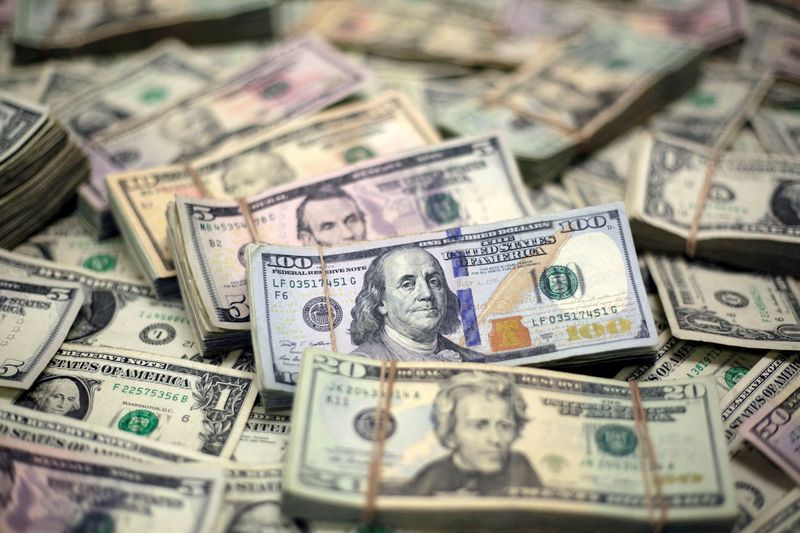
By Alden Bentley
NEW YORK (Reuters) -The dollar fell and sterling rose to its highest in more than two years on Friday after Federal Reserve Chair Jerome Powell gave an unambiguous signal that the long-anticipated U.S. interest rate cut would come next month.
The weak dollar also saw the euro hit a 13-month high, and the U.S. currency marked a 17-day low versus the yen.
At his keynote speech to the Kansas City Fed’s annual economic conference in Jackson Hole, Wyoming, Powell said, “The time has come for policy to adjust,” given that upside risks to inflation have diminished and downside risks to employment have increased.
“We do not seek or welcome further cooling in labor market conditions,” Powell said. “We will do everything we can to support a strong labor market as we make further progress toward price stability. With an appropriate dialing back of policy restraint, there is good reason to think that the economy will get back to 2% inflation while maintaining a strong labor market.”
Traders on Friday continued to bet on a quarter-percentage-point rate cut at the Fed’s Sept. 17-18 meeting, putting the odds at 65% after Powell’s remarks. But they priced in about a one-in-three chance of a bigger 50-basis point cut, up from a little more than a one-in-four probability earlier.
The euro and yen rose. This weakened the dollar index, which measures the greenback against a basket of six currencies including those two. The index fell 0.81% from late Thursday to 100.64, having been slightly firmer before Powell spoke.
“I think the markets’ reaction, which has been the dollar a bit weaker, bond yields a bit lower, is about right. It’s not like he said, ‘Yeah, we’re going to do three (cuts of) 50s to begin the easing cycle’,” said Steve Englander, head of G10 FX research at Standard Chartered (OTC:SCBFF) Bank in New York.
“Implicitly, it opens the door to 50s at some point without giving a timetable for it. We still don’t think 50 (basis points) is going to be the first move, but it could come quickly if the labor market continues to weaken,” he said, referring to the Fed chief’s remarks on inflation and employment.
A move in September would pivot the Fed away from a restrictive interest rate policy in place since it started hiking to fight inflation in March 2022, hoisting the fed funds target range from about zero to 5.25%-5.5%, where it has stood since July 2023.
Later on Friday Federal Reserve Bank of Chicago President Austan Goolsbee said in a CNBC interview that while he’s not ready to explicitly call for a central bank rate cut, monetary policy is quite tight and not aligned with current economic conditions.
“FX is a relative game, so the expectation for the Fed to join the other major banks soon in cutting rates is driving the dollar lower,” said Uto Shinohara, managing director and senior investment strategist at Mesirow in Chicago.
Sterling climbed to a more than two-year high against the greenback as Powell’s dollar-negative comments dovetailed with signs of strength in the UK economy.
The pound was up 0.94% in the afternoon at $1.3211. It reached $1.32295, its highest since late March 2022 after surpassing the 2023 high of $1.3144.
Aiding the move was a survey that showed British consumer confidence held at an almost three-year high in August, adding to positive signals in the wider economy.
The euro ended up 0.75% at $1.1195, just below an afternoon high of $1.12015, a price not seen since July 20, 2023.
Dollar/yen fell to its lowest since Aug. 6, wrapping up the day down 1.36% to 144.27.
The yen had been supported since BOJ Governor Kazuo Ueda earlier on Friday reaffirmed his resolve to raise rates if inflation stayed on course to sustainably hit the bank’s 2% target.
The “comments suggest that market turbulence won’t deter the BOJ from considering more rate hikes in the future even if the next move isn’t imminent,” said Vasu Menon, managing director of investment strategy at OCBC.
“As long as the move in the dollar-yen is orderly and gradual, this should not rattle global markets as much as it did earlier this month.”
Against the Swiss franc, the dollar weakened 0.52% to 0.848 francs.
Dollar/Canada fell 0.82% to C$1.3511.

The Australian dollar strengthened 1.36% to US$0.6795. The kiwi strengthened 1.53% to $0.6229.
Bitcoin advanced 4.2% to $63,227.00.
This post is originally published on INVESTING.



